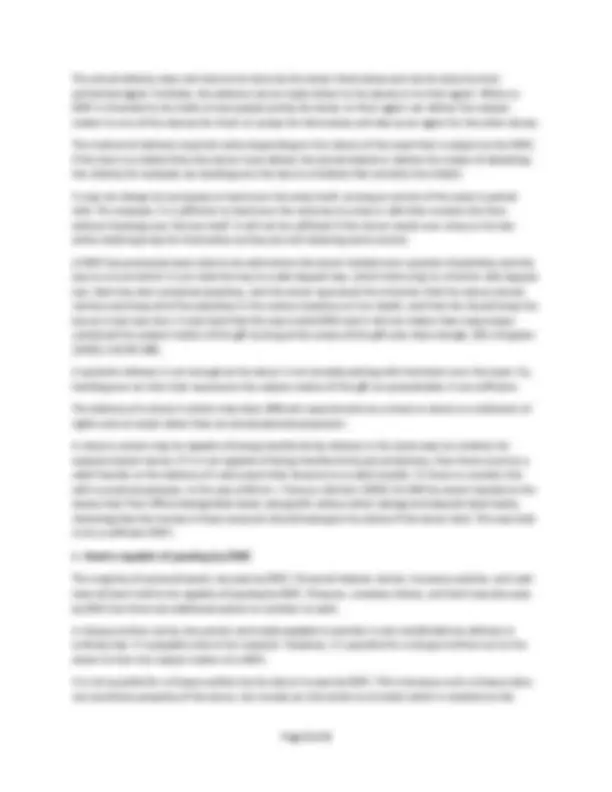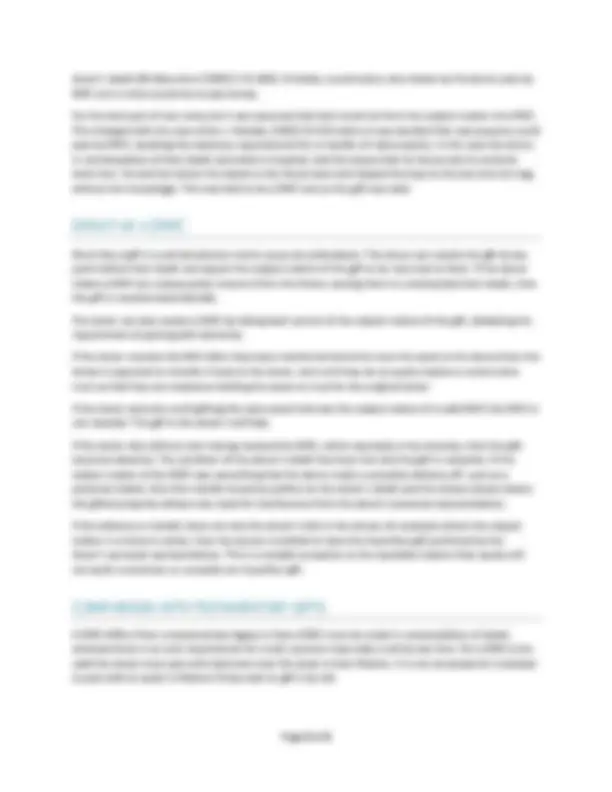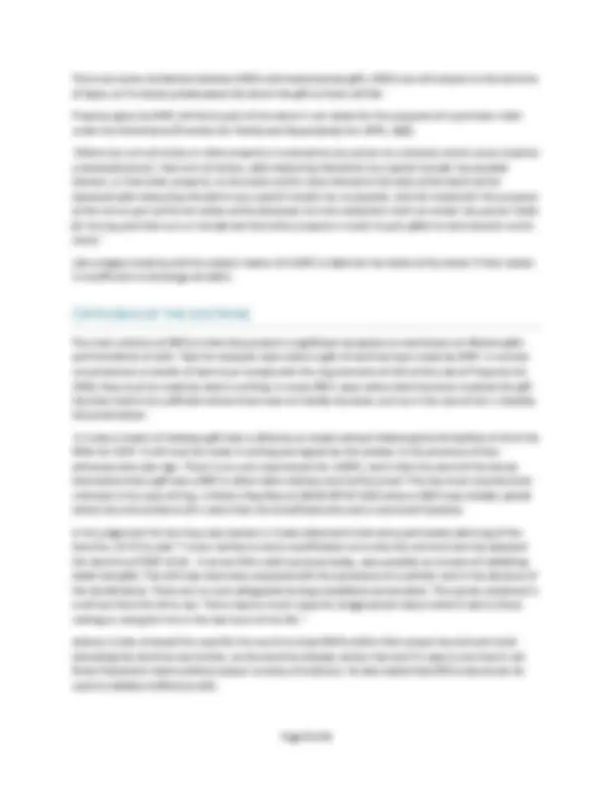





Study with the several resources on Docsity

Earn points by helping other students or get them with a premium plan


Prepare for your exams
Study with the several resources on Docsity

Earn points to download
Earn points by helping other students or get them with a premium plan
Community
Ask the community for help and clear up your study doubts
Discover the best universities in your country according to Docsity users
Free resources
Download our free guides on studying techniques, anxiety management strategies, and thesis advice from Docsity tutors
The concept of Donations Mortis Causa (DMC), also known as deathbed gifts. DMCs are neither lifetime gifts nor gifts by will, but rather a unique category of transfers that require specific conditions to be met. This document delves into the requirements for making a valid DMC, its effects, and related topics such as assets capable of passing by DMC and criticisms of the doctrine.
What you will learn
Typology: Lecture notes
1 / 6

This page cannot be seen from the preview
Don't miss anything!




For this month’s paper we’re delving into a more theoretical area of succession law and covering donations mortis causa (singular: donation mortis causa ) or DMC’s for short. DMC’s occupy an interesting space between lifetime gifts and gifts by will, so let’s take a look at the requirements of making one and their effects.
Donatio mortis causa literally translates as ‘a gift on account of death’, and they are often referred to as simply deathbed gifts. A DMC is neither a lifetime gift nor a gift by will. It must meet the following strict requirements to be valid:
The donor must make the gift at a time where he is contemplating his own death. It is not enough to be contemplating death in a vague sense at some point in the future, the donor must believe that they are going to die. The fact that the donor actually anticipates death is subjective. What is important is that they genuinely believe they will die in the near future, even if they are incorrect.
Interestingly it does not seem to matter whether the cause of death that the donor anticipates is actually what kills them. In the case of Wilkes v Allington [1931] 2 Ch.104. In this case at the time the donor made the DMC he knew he was suffering from cancer and believed it to be terminal. He did not know how long he had left to live but believed it likely he would die soon. A month later he died from a case of pneumonia unrelated to the cancer. The DMC was valid because it was not conditional on his death from a particular cause.
The donor must have reason to anticipate death in the near future from a known cause. This has recently been a point of contention. In the case of Vallée v Birchwood [2014] Ch.271 it was initially decided that a DMC was valid where the donor handed over the deeds to his house to a nephew in the belief that he would be dead by Christmas even though they were suffering from no illness and there was no reason for them to hold such a belief. The death did not occur until 4 months after the gift was made. This case also becomes notable later on when we discuss the burden of proof.
Vallée was later overruled by the recent case of King v Chiltern Dog Rescue [2015] W.T.L.R. 1225. In this case it was held that the earlier decision was wrong and there could be no valid DMC where the donor did not anticipate death in the near future from a known cause. It was decided that the earlier decision in Vallée should not be followed because, as Jackson LJ put it, the donor “like many elderly people, was approaching the end of his natural lifespan. But he did not have reason to anticipate death in the near future from a known cause.”
The donor must intend for the gift to be conditional upon his own death. It must be clear that he intends to give the gift only if he actually dies. Up until the donor’s death they may revoke the gift and expect to have the subject matter returned to them. Similarly, if they make the gift and then recover so that their reason for contemplating death is no more the gift is revoked.
The donor must express his intention to make the gift conditional on gift, but this expression can be inferred from the circumstances of how the gift was made. In Gardner v Parker (1818) 3 Madd. 184 the donor was gravely ill and confined to his bed. Two days before his died he gave to the donee a bond for £1,800 stating ‘There, take that and keep it’. This was held to be a valid DMC as it was inferred from the circumstances that they intended the gift to be conditional upon their death.
I gift cannot be a valid DMC if the donor wishes the gift to take effect immediately. This would simply be a lifetime gift. Likewise, a gift cannot be a DMC if the donor doesn’t intend to part with control over the subject matter of the gift in lifetime, and only wishes to part with the asset on his death. This would be a testamentary gift.
The donor must ‘part with dominion’ over the subject matter of the DMC i.e. they must actually deliver the gift to the recipient, or hand over control of it in some other way. There are two elements to this; the donor’s intention and the actual physical transfer.
For the DMC to be valid the donor must intend to part with control over the subject matter. In the case of Reddel v Dobre (1834) 10 Sim.244 the donor delivered a lockbox to the donee, telling her that the box contained money for her. She was instructed to return the box to him every 3 months, and after his death she was to go to his son for the key. It was held that there was no DMC in this case as the donor had not intended to part with control of the contents of the box in his lifetime. He has reserved to himself the right to deal with the contents and had not given the recipient of the box control of the key.
The second element of parting with dominion is the actual delivery of the subject matter of the DMC. The donor must deliver the subject matter in his lifetime, though it does not matter whether the delivery is made before or after the intention to make the DMC is expressed ( Cain v Moon [1896] 2 Q.B 283).
If the donor fails to part with dominion in his lifetime the DMC will fail, regardless of whether intention to make the DMC has been expressed. In the case of Hardy v Baker (1738) West t. Hard. 519 the donor instructed his servant to deliver property to the donee after the donor’s death. There was no valid DMC as the donor had failed to deliver the property to the donee in his lifetime.
donor’s death ( Re Beaumont [1902] 1 Ch.886). Similarly, a promissory note drawn by the donor pass by DMC as it is only a promise to pay money.
For the best part of two centuries it was assumed that land could not form the subject matter of a DMC. This changed with the case of Sen v Headley [1991] Ch 425 where it was decided that real property could pass by DMC, avoiding the statutory requirements for a transfer of real property. In this case the donor, in contemplation of their death and while in hospital, told the donee that his house and its contents were hers. He told her where the deeds to the house were and slipped the keys to the box into her bag without her knowledge. This was held to be a DMC and so the gift was valid.
EFFECT OF A DMC
Much like a gift in a will donationes mortis causa are ambulatory. The donor can revoke the gift at any point before their death and expect the subject matter of the gift to be returned to them. If the donor makes a DMC but subsequently recovers from the illness causing them to contemplate their death, then the gift is revoked automatically.
The donor can also revoke a DMC by taking back control of the subject matter of the gift, defeating the requirement of parting with dominion.
If the donor revokes the DMC after they have transferred dominion over the asset to the donee then the donee is expected to transfer it back to the donor, and until they do so equity implies a constructive trust so that they are treated as holding the asset on trust for the original donor.
If the donor executes a will gifting the same asset that was the subject matter of a valid DMC the DMC is not revoked. The gift in the donor’s will fails.
If the donor dies without ever having revoked the DMC, either expressly or by recovery, then the gift becomes absolute. The condition of the donor’s death has been met and the gift is complete. If the subject matter of the DMC was something that the donor made a complete delivery off, such as a personal chattel, then the transfer becomes perfect on the donor’s death and the donee simply retains the gifted property without any need for interference from the donor’s personal representatives.
If the delivery or transfer does not vest the donor’s title in the donee, for example where the subject matter is a chose in action, then the donee is entitled to have the imperfect gift perfected by the donor’s personal representatives. This is a notable exception to the equitable maxims that equity will not assist a volunteer or complete an imperfect gift.
COMPARISON WITH TESTAMENTARY GIFTS
A DMC differs from a testamentary legacy in that a DMC must be made in contemplation of death, whereas there is no such requirement for a will; a person may make a will at any time. For a DMC to be valid the donor must part with dominion over the asset in their lifetime. It is not necessary for a testator to part with an asset in lifetime if they wish to gift it by will.
There are some similarities between DMCs and testamentary gifts. DMCs are still subject to the doctrine of lapse, so if a donee predeceases the donor the gift to them will fail.
Property given by DMC still forms part of the donor’s net estate for the purposes of a provision claim under the Inheritance (Provision for Family and Dependants) Act 1975, s8(2):
‘Where any sum of money or other property is received by any person as a donatio mortis causa made by a deceased person, that sum of money, after deducting therefrom any capital transfer tax payable thereon, or that other property, to the extent of the value thereof at the date of the death of the deceased after deducting therefrom any capital transfer tax so payable, shall be treated for the purposes of this Act as part of the net estate of the deceased; but this subsection shall not render any person liable for having paid that sum or transferred that other property in order to give effect to that donatio mortis causa.’
Like a legacy made by will the subject matter of a DMC is liable for the debts of the donor if their estate in insufficient to discharge all debts.
CRITICISMS OF THE DOCTRINE
The main criticism of DMCs is that they present a significant exception to restrictions on lifetime gifts and formalities of wills. Take for example cases where a gift of land has been made by DMC. In normal circumstances a transfer of land must comply with the requirements of s52 of the Law of Property Act 1925; they must be made by deed in writing. In many DMC cases where land has been involved the gift has been held to be sufficient where there was no transfer by deed, such as in the case of Sen v Headley discussed above.
It is also a means of making a gift that is effective on death without following the formalities of s9 of the Wills Act 1837. A will must be made in writing and signed by the testator in the presence of two witnesses who also sign. There is no such requirement for a DMC, and in fact the word of the donee themselves that a gift was a DMC is often taken without any further proof. This has most recently been criticised in the case of King v Chiltern Dog Rescue [2015] WTLR 1225 where a DMC was initially upheld where the only evidence of it came from the beneficiary who was a convicted fraudster.
In his judgement for the King case Jackson LJ made statements that were particularly damning of the doctrine. At 53 he said: “I must confess to some mystification as to why the common law has adopted the doctrine of DMC at all… it serves little useful purpose today, save possibly as a means of validating death bed gifts. The will may have been prepared with the assistance of a solicitor and in the absence of the beneficiaries. There are no such safeguards during a deathbed conversation. The words contained in a will are there for all to see. There may be much scope for disagreement about what D said to those visiting or caring for him in the last hours of his life.”
Jackson LJ also stressed the need for the courts to keep DMCs within their proper bounds and resist extending the doctrine any further, as the doctrine already carries risks and it’s easy to see how it can foster fraudulent claims without proper scrutiny of evidence. He also stated that DMCs should not be used to validate ineffective wills.